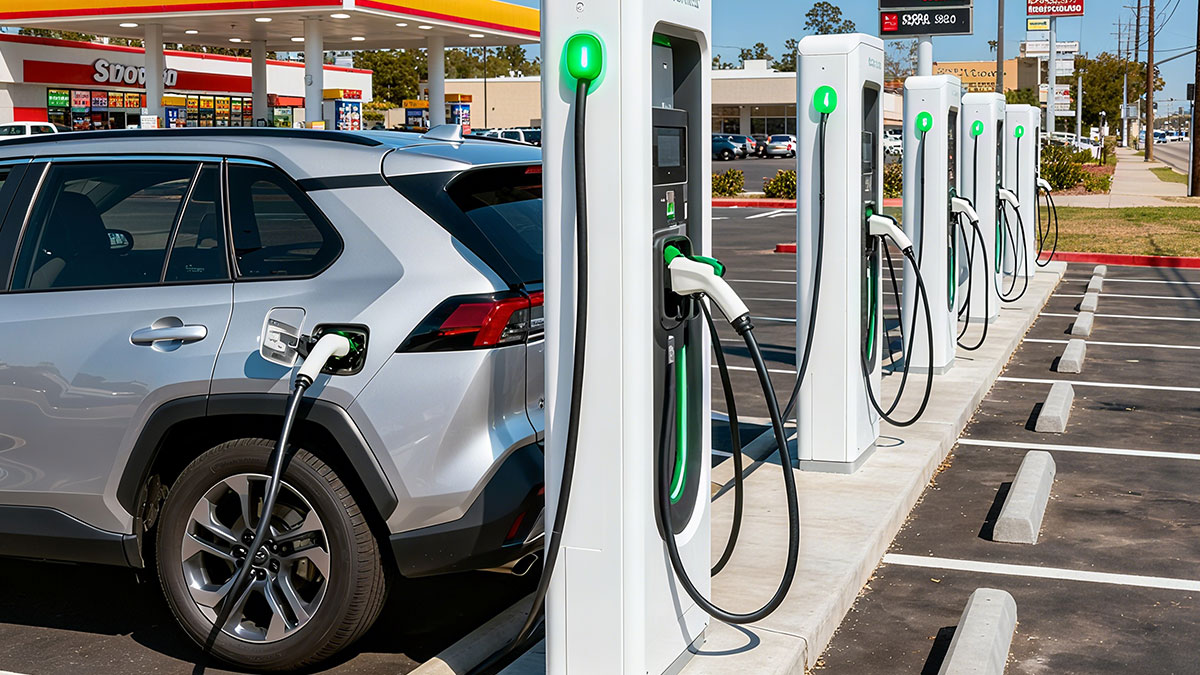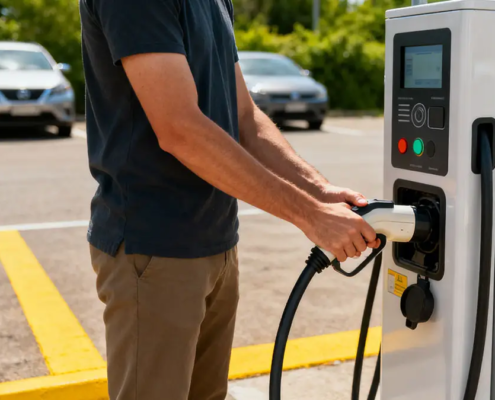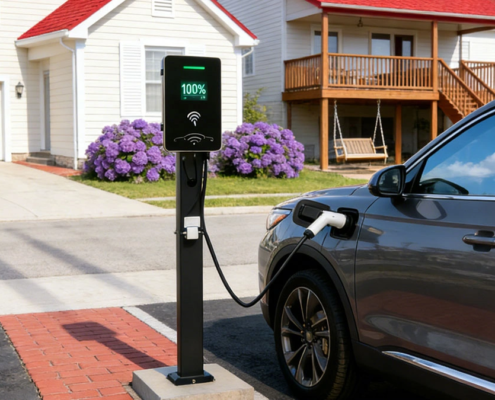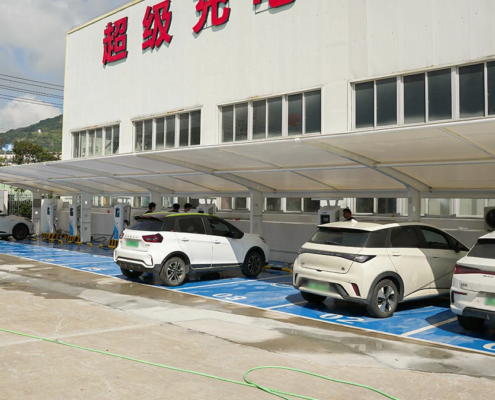Introduction
The commercial EV charging station cost is one of the biggest questions for businesses investing in electric vehicle infrastructure. As the world moves toward sustainable transportation, EV adoption is booming — but charging infrastructure still lags behind.
According to the International Energy Agency (IEA), more than 14 million electric vehicles were sold worldwide in 2023, accounting for 18% of all new cars. In the U.S. alone, EV sales jumped from just 17,000 in 2011 to over 1.5 million in 2023 — an 80-fold increase. Yet, with only about 145,000 public charging ports across the country, there’s still a serious gap between EVs on the road and available charging infrastructure.
This growing imbalance creates a huge opportunity for commercial EV charging solutions. Whether you’re a property developer, hotel owner, retailer, or business park operator, installing charging stations isn’t just about going green — it’s a smart long-term investment with strong returns.
So, how much does it cost to install a commercial EV charging station?
Let’s break down the real numbers behind hardware, installation, maintenance, and incentives — so you can plan your EV infrastructure investment with confidence.
Types of Commercial EV Charging Stations
Commercial EV chargers generally come in three types: Level 1, Level 2, and DC fast charging (Level 3).
Level 1 chargers use a standard 120V household outlet. They typically add only 3–5 miles of range per hour, making them far too slow for commercial use.
For business applications, the two real options are Level 2 and DC fast charging. These differ in power, speed, installation requirements, and total investment.
Level 2 Chargers: The Mainstream Choice for Businesses
Level 2 EV chargers are the most common commercial charging option today.
They operate on a 240V power supply — the same voltage used for dryers or ovens — and deliver 3.3kW to 19.2kW of power, adding about 25–30 miles of range per hour.
That’s fast enough for locations where vehicles park for several hours, such as:
- Office buildings
- Hotels
- Shopping centers
- Hospitals
- Employee parking lots
Level 2 charging stations are affordable, reliable, and widely compatible with all major EV models — from Tesla and BMW to Hyundai, Volkswagen, and BYD.
They take up little space, can be installed indoors or outdoors, and are ideal for steady daily charging needs.
Modern Level 2 chargers also support smart network management, including remote monitoring, load balancing, and dynamic pricing — allowing businesses to manage charging operations efficiently.
For sites where customers or employees spend time — and where charging demand is predictable — Level 2 stations offer the best return on investment with low setup costs and short payback periods.
DC Fast Charging: The Power Option for High-Traffic Locations
DC fast chargers (Level 3) deliver the fastest charging speeds available.
Instead of using onboard vehicle converters, they send direct current straight into the battery — typically ranging from 50kW up to 350kW or more.
That means a car can gain 200–250 miles of range in 30–60 minutes.
These stations are best suited for high-traffic, short-stay commercial locations, such as:
- Highway service stations
- Fuel stations
- Quick-service restaurants
- Transit hubs
- Tourist destinations
Businesses in these locations can benefit from increased visibility and customer dwell time. A driver who spends half an hour charging may grab a coffee, buy snacks, or sit down for a meal — turning charging time into sales revenue.
However, DC fast chargers come with higher upfront costs and more complex installation requirements.
They often require dedicated high-voltage service lines, transformer upgrades, thicker cabling, and active cooling systems.
Initial investment can easily exceed $50,000 per unit — but the payoff is substantial for high-turnover commercial properties or networks aiming to serve fleet customers and travelers.
The Business Value of Installing Commercial Charging Stations
Installing EV charging stations is more than an infrastructure upgrade — it’s a strategic business move that pays off in multiple ways.
1. Attract More Customers
A 2023 Volvo survey found that 55% of EV drivers prefer businesses with charging stations, and they spend 22% more per visit on average.
That makes chargers both a service and a customer retention tool — helping your business stand out and build loyalty.
2. Strengthen Your Green Brand Image
More than 80% of consumers say they’re more likely to support eco-friendly brands.
By investing in electric vehicle infrastructure, your business shows real commitment to sustainability — a message that resonates with modern customers and boosts your ESG performance.
3. Generate Additional Revenue
Commercial EV stations can directly generate income through pay-per-use charging fees, membership programs, or digital advertising displays on smart chargers.
In many retail and hospitality settings, charging brings in new customers — a win-win for revenue and brand value.
4. Take Advantage of Government Incentives
Governments around the world are supporting EV infrastructure expansion with tax credits and funding.
In the U.S., the Inflation Reduction Act (IRA) offers up to 30% in federal tax credits (Form 8911) for commercial charging installations.
Some states add another $4,000–$10,000 per charging port in local incentives.
In Europe, similar initiatives like the Alternative Fuels Infrastructure Regulation (AFIR) provide subsidies and require new commercial buildings to include EV charging.
Together, these programs can cut initial project costs by up to one-third, making the investment more accessible and profitable.
Breaking Down the Commercial EV Charging Station Cost
Here’s a clear overview of the typical EV charging station pricing for commercial sites:
| Cost Category | Level 2 Charging Station | DC Fast Charging Station |
|---|---|---|
| Hardware | $2,500 – $7,000 | $20,000 – $50,000 |
| Installation | $2,000 – $5,000 | $10,000 – $50,000 |
| Software & Network Fees (annual) | $200 – $500 | $500 – $1,000 |
| Maintenance (annual) | $500 – $1,000 | $1,000 – $3,000 |
| Total Initial Cost | $4,500 – $12,000 | $30,000 – $100,000 |
| Ongoing Annual Cost | $700 – $1,500 | $1,500 – $4,000 |
Key Factors That Affect Cost
- Electrical capacity & grid connection: DC fast chargers often need transformer upgrades or new high-voltage service.
- Site conditions & installation complexity: trenching, cabling, and weatherproofing add costs.
- Software features: advanced EV charging management systems (remote monitoring, billing, load balancing) can raise fees.
- Location: labor and permit costs vary widely by region.
- Equipment certification: UL, CE, and TUV certified chargers cost more upfront but reduce long-term risk.
Financing and Investment Options
Businesses can approach EV charging station investment in several ways:
1. Direct Ownership
Best for businesses with strong cash flow. You buy the equipment, manage operations, and keep all profits. Upfront cost is higher, but long-term ROI is steady — ideal for owned properties or large commercial campuses.
2. Leasing or Rental
If you prefer to preserve capital, leasing allows you to pay monthly or yearly.
The supplier usually handles maintenance and software updates.
The trade-off: total long-term cost may be higher and ownership rights are limited.
3. Charging-as-a-Service (CaaS)
A subscription model where you pay a service fee to access a complete charging solution — hardware, software, and support included.
Perfect for businesses without technical staff or infrastructure expertise.
CaaS makes scaling easy across multiple sites.
Choosing the Right Charging Setup for Your Business
There’s no single best option — the right choice depends on your location, customers, and traffic patterns.
Long-stay sites (offices, hotels): focus on Level 2 chargers for cost efficiency.
High-turnover areas (gas stations, highways): invest in DC fast charging for speed and visibility.
Mixed-use sites: combine both to serve all drivers.
When selecting equipment, look for OCPP 2.0 compatibility, remote monitoring, and safety certifications (CE, UL, TUV).
Partnering with a reliable supplier ensures long-term stability and scalability.
Why Choose AnengJi as Your EV Charging Partner
At AnengJi, we design and manufacture high-performance EV chargers for businesses worldwide.
Our portfolio includes 50kW to 350kW DC fast chargers supporting CCS, CHAdeMO, and NACS standards, complete with liquid-cooled cables and smart energy management systems.
Backed by a 40,000 m² advanced production facility equipped with TRUMPF laser cutting and CNC bending centers, we maintain the highest manufacturing standards under ISO 9001.
All products are certified by CE, TUV, UL, and CB, ensuring full compliance in over 100 countries.
From highway rest stops to industrial parks, we’ve delivered customized EV charging solutions in regions like Georgia and Kyrgyzstan — helping clients expand their charging networks with confidence.
Conclusion: Charging Infrastructure Is the Future of Business
Investing in a commercial EV charging station isn’t just a sustainability gesture — it’s a strategic business move with measurable returns.
While upfront costs can be significant, the combination of government incentives, increased customer traffic, and new revenue streams means most businesses see payback within 3–5 years.
As EV adoption accelerates, charging will soon be a standard business amenity — not an optional perk.
By planning smartly now, your business can be part of the EV revolution and stay ahead of the competition.
Whether you’re installing your first station or building a multi-site network, AnengJi provides the expertise, technology, and reliability you need to power the future.
FAQ: Commercial EV Charging Station Cost & Installation
1. How much does it cost to install a commercial EV charging station?
Depending on power level and setup, the cost of EV charging station installation ranges from $4,500 for Level 2 to $100,000 for DC fast chargers.
2. What’s the average cost of a DC fast charger?
A single DC fast charger can cost between $20,000–$50,000 for hardware, plus another $10,000–$50,000 for installation.
3. What’s the difference between Level 2 and Level 3 chargers?
Level 2 uses 240V AC and adds about 25 miles of range per hour.
Level 3 (DC fast) uses 480V DC and can add up to 250 miles in under an hour.
4. Are there government incentives for EV charging infrastructure?
Yes — U.S. federal and state programs offer tax credits up to 30%, plus local rebates that can reduce your project cost significantly.
5. What’s the ROI for a commercial EV charging station?
Most businesses recover their investment in 3–5 years, depending on usage, pricing, and available incentives.








Leave a Reply
Want to join the discussion?Feel free to contribute!